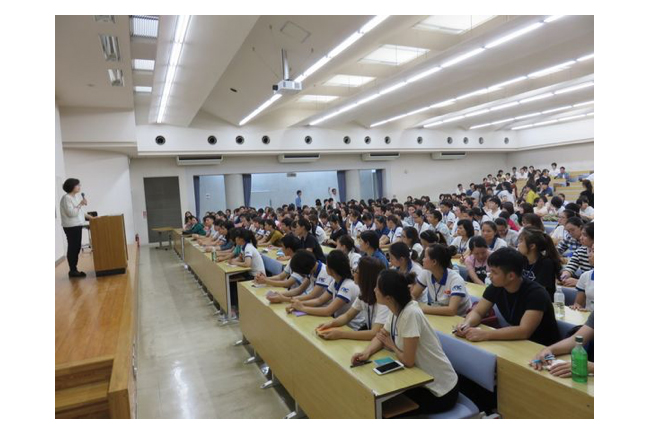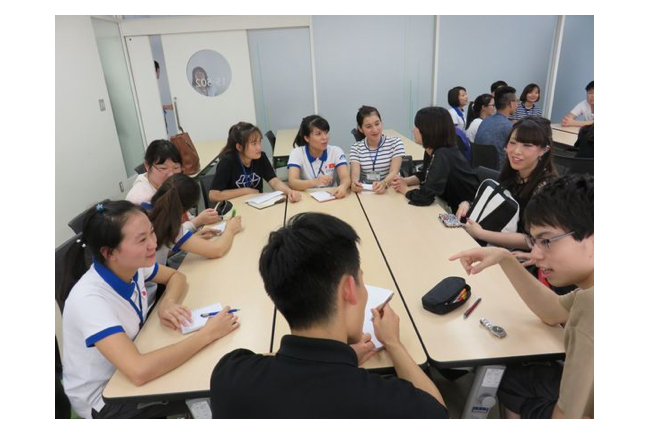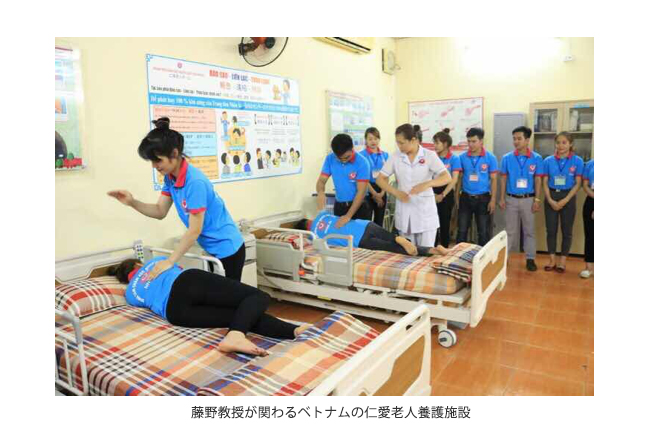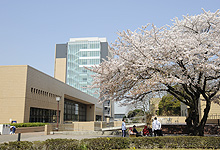Shukutoku University holds an exchange meeting with Vietnamese certified care workers every year. In 2017, at the Special Elderly Care Home Kyoseien (Chiba City, Chiba Prefecture) on July 7, 18 third and fourth graders of the Department of Social Welfare, Faculty of Comprehensive Welfare, and 3 Vietnamese certified care workers in their 4s. People participate.After visiting the museum, we divided into groups and exchanged opinions.

Japan has signed Economic Partnership Agreements (EPAs) with Indonesia, the Philippines, and Vietnam, and has been gradually accepting nurses and certified care worker candidates since FY3.Vietnamese caregiver candidates will come to Japan as a personnel exchange of the Ministry of Foreign Affairs based on the Japan-Vietnam Economic Partnership Agreement.In addition to receiving specialized nursing education in the home country, after studying Japanese for one year and obtaining a Japanese language test at the level of daily conversation, training is conducted at each facility in Japan, and three years later, the national examination for care workers is passed. Aim for. In addition to the addition of a certified care worker to the status of residence due to the revision of the Immigration Control Law in January 2008, a foreign technical intern training system for long-term care started with the enforcement of the Technical Intern Training Law in November. Expectations for a certified worker are only increasing.
Experience required of future social workers
Exchanges with Vietnamese certified care workers at Shukutoku University have continued since 2014, taking advantage of support activities such as on-site lessons by faculty members such as Professor Tatsuya Fujino of the Faculty of Comprehensive Welfare in Vietnam.
"At welfare facilities in Japan, as the birthrate declines and the population ages, we will have to work together with foreigners and manage them. We can think about scientific independence support for welfare. At the same time, future social welfare workers are required to have management ability with an understanding of the field. For that purpose, not only knowledge but also various experiences are required. This exchange meeting is also difficult. I didn't have any discussions, I just briefly talked about my thoughts such as self-introduction and everyday life, but for Japanese students, I understand the background of Vietnam's coming to Japan and getting a welfare job. It is not so easy to do. By knowing and deepening understanding of Vietnam and Japan, each other's life, culture, and personality, we can build a better relationship in the future of welfare work together. Even if linguistic communication does not go well, the attitude of trying to understand each other and non-verbal communication are necessary skills in the field of welfare, so they can be understood by actively interacting with each other. There must be many places. Having such exchanges from an early stage is a good experience for students, and I think it is a good opportunity for Vietnamese people to understand Japan and get used to it quickly. " Professor Fujino talked about the purpose of holding the exchange meeting.

Understand the true "welfare" and think from a global perspective
Even in the world of welfare, globalization can no longer be avoided.And Japan's problems regarding the declining birthrate and aging society are not the problems of Japan alone at present, but also the problems of Asia in the future.Japan's problem-solving can set a precedent for countries with large populations.In fact, Japanese facilities and long-term care technology are being exported to Asian countries.For foreigners, acquiring skills in Japan is also an opportunity to lead a rich life, such as building a living base in Japan and expanding the possibilities of work with those skills after returning to their home country. ..

Welfare is often regarded as long-term care, but "welfare" means that people are "happy" and "social welfare" means the realization of "welfare" by social means and methods.Creating a global, circular society with full welfare for all people, from children to adults, not just the elderly, is to create a bright future where not only the elderly but also young people can live with peace of mind.
Shukutoku University aims to develop human resources to realize an ideal society that supports the independence of each individual. It was opened as a single department university.As the university's founding philosophy of "symbiosis," "must be together with him, not for him," is exactly what is relevant to the present world. it might be.
As each country actively promotes welfare policies, it is meaningless unless it is not only a solution to the long-term care problem in Japan but also beneficial to both foreign care workers who come to Japan.The basis of a global perspective is "to know the other person."No matter how large the scale, education that values this basic understanding that the university is working on is becoming more important because it is ultimately driven by humans.

